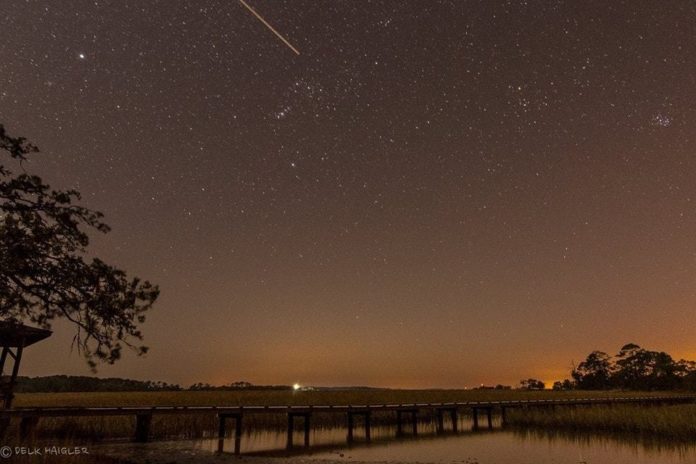Take a long look up in the night sky over the Lowcountry and you just might be in for a treat as the annual Lyrid meteor shower invades the sky over Beaufort tonight.
The first meteor shower of spring peaks overnight tonight, April 21st and into the early hours of Wednesday, in a dark sky less than a day before the new moon. Without any glaring moonlight to obstruct the view, skywatchers will have an excellent view of the show.
There hasn’t been a meteor shower to light up the sky since early January, and this one will be visible around the globe.
The waning moon will allow a better view of these bright meteors with the best time to see them being late this evening and into the early morning hours of Wednesday, between midnight and 4am and 5am.
From a dark, clear sky, observers in the Northern Hemisphere can expect to see as many as 10 to 20 meteors per hour during the shower’s peak. Because the shower is active from mid- to late April, some Lyrid meteors may still appear before and after the peak, but tonight will be your best chance to see them.
The shower occurs this time each year when Earth’s orbit crosses paths with that of Comet Thatcher. The comet loses pieces of itself that go flying into our upper atmosphere at 110,000 miles per hour.
Lyrid gets its name from the Lyra constellation. The Lyrid shower is one of the oldest known, with records of visible meteors going back 2,700 years, according to EarthSky.
How to see them
If you live in an urban area, you may want to drive to a place that isn’t littered with city lights that will obstruct your view.
Find an open area with a wide view of the sky. Make sure you have a chair or blanket so you can look straight up. And give your eyes about 20 to 30 minutes to adjust to the darkness, without looking at your phone, so meteors are easier to spot.
Also, keep an eye out for a grouping of Jupiter, Saturn and Mars in the sky. This won’t happen again for a couple of years, according to NASA.










